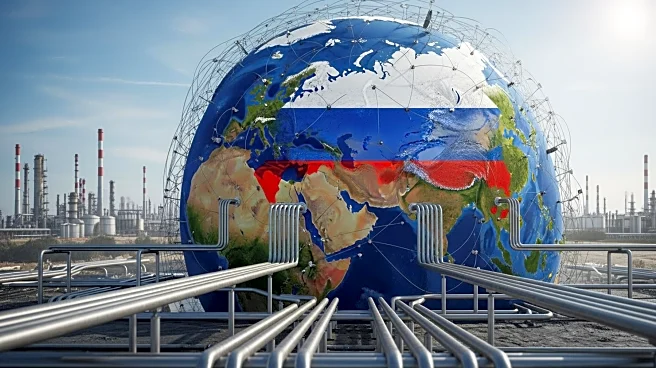What's Happening?
The Iraqi government has announced it can no longer collaborate with Russian oil company Lukoil due to US sanctions imposed on the firm. Lukoil, which holds a 75% stake in Iraq's West Qurna-2 oil field, has declared force majeure, citing circumstances
beyond its control that prevent it from fulfilling its contractual obligations. The sanctions, announced by President Trump, have frozen Lukoil's ability to pay salaries to its employees, most of whom are Iraqi nationals. The US Treasury has intervened to block Lukoil's attempt to sell its overseas operations to an Austrian company, further complicating the situation. The sanctions have also affected Lukoil's global assets, valued at over $20 billion, and have led to the suspension of crude oil payments owed to Lukoil by Iraq's State Oil Marketing Organization (SOMO.
Why It's Important?
The sanctions against Lukoil highlight the broader geopolitical tensions between the US and Russia, particularly in the context of Russia's actions in Ukraine. The inability of Lukoil to operate effectively in Iraq could have significant implications for the country's oil production and economic stability, given the company's substantial stake in one of Iraq's largest oil fields. Additionally, the sanctions may deter other international companies from engaging with Russian firms, potentially isolating Russia further in the global market. The situation underscores the impact of US foreign policy on international business operations and the potential for economic disruptions in regions reliant on Russian investments.
What's Next?
The Iraqi government and Lukoil are likely to seek alternative solutions to address the operational challenges posed by the sanctions. This may involve negotiating with the US Treasury to establish a compliant payment mechanism or exploring other partnerships to maintain oil production levels. The situation may also prompt other countries and companies to reassess their dealings with Russian firms, considering the risk of sanctions. The US may continue to leverage economic measures to influence Russia's international activities, particularly in response to geopolitical conflicts.
Beyond the Headlines
The sanctions against Lukoil could lead to broader discussions on the ethical implications of using economic measures as a tool of foreign policy. The impact on Iraqi workers and the local economy raises questions about the collateral damage of such sanctions. Additionally, the situation may influence future legislative actions in countries hosting Russian assets, as seen in Bulgaria's move to draft legislation to protect its refinery from US sanctions.
















